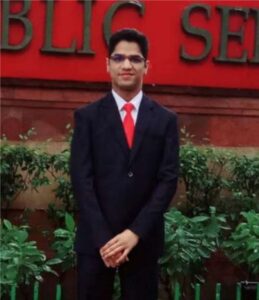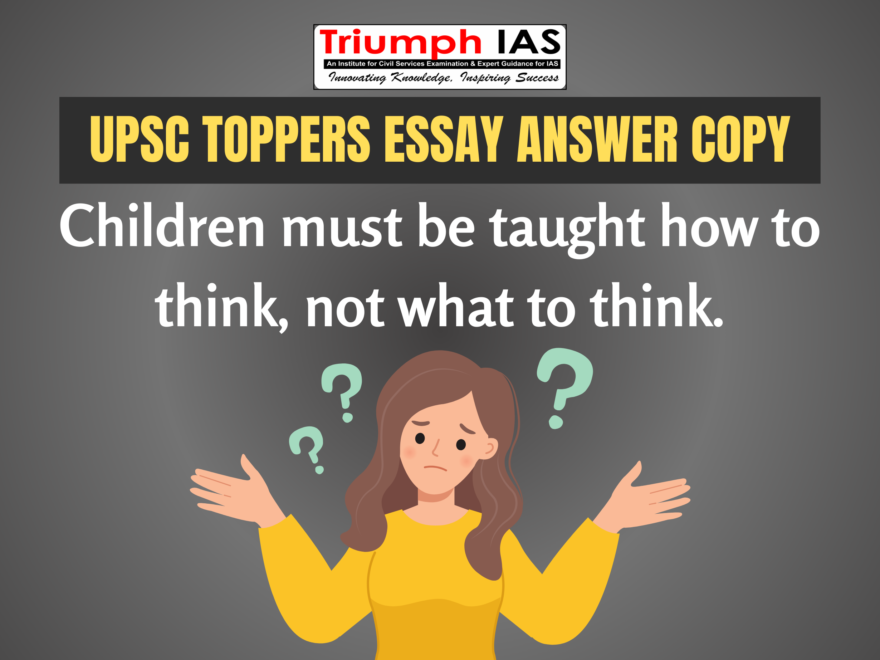IPS, Adarsh Kant Shukla

Essay Topic:
Children must be taught how to think, not what to think
(Relevant for Essay Writing for UPSC Civil Services Examination)
The UPSC Mains Exam consists of total 9 papers, including an essay paper, which is crucial for determining the final result and ranking of candidates. Unlike Optional Subjects, the essay paper requires depth study, making it a significant factor in the selection process. The Essay Paper in the IAS Mains Exam comprises two sections, A and B, each containing four topics worth 125 marks, totaling 250 marks (125×2). Candidates are required to choose one topic from each section and write an essay of 1,000 to 2,000 words within the allocated three-hour time frame. When it comes to writing an essay for the UPSC exam, it should be well-structured, easy to understand, comprehensive, succinct, composite, definite, informative, and logical. To effectively prepare for the essay paper, practicing Essay Test Series and seeking Essay Mentorship are crucial. Many Toppers, including RAJAT YADAV, 141 Marks (Highest marks in Essay in CSE 2022), have followed 𝑽𝙞𝒌𝙖𝒔𝙝 𝙍𝒂𝙣𝒋𝙖𝒏 𝑺𝙞𝒓’𝒔 approach and wisdom for writing the essay.
Children must be taught how to think, not what to thinkIn a distant college in America, there was this shy but curious student who used to ask a lot of questions to his teachers, due to which his classmates often made fun of him. Once he asked his teacher whether birds fly because they eat insects. The teacher, who thought this question was silly and irrelevant, called the boy’s mother and referred to the boy as academically incompetent due to his unique thoughts. After 30 odd years, this boy invented the concept of artificial light, i.e., the electric bulb, and the boy was none other than Thomas Alva Edison, the prominent scientist. This example highlights the tendency of society to dismiss or modify the thoughts of children in order to conform them to societal expectations. This prevalent practice leads to the loss of potential Edisons in many societies, creating mere clones of conformists. Children are compared to earthen pots; we can mold them in whichever shape we desire when they are in their formative stage. However, society often tries to decide the content of the pot as well. It not only shapes the direction of thinking but also starts to decide the elements of thoughts, leading to repercussions for both child and society. Children represent the future of society; they have immense potential to change the course of future generations. However, this can be facilitated only through unbridled creative zeal and lack of restrictions in broadening the horizon of thoughts. Society’s role is to nudge the children slightly when they are turning in a negative direction without altering the process as a whole. The thinking of children is shaped in many spheres. In countries like India, patriarchy is normalized from childhood by promoting dolls for girls and gun toys for boys. A boy playing with a doll is portrayed as feminine or taboo. Similarly, kids from Dalit “bastis” (cheris) are often molded into believing that poverty is fatalism and a result of previous birth’s sins. This prevents the revolutionary and reformist potential of children from infancy. A heart-wrenching portrayal of societal influence on children is seen in the Oscar-winning movie “Schindler’s List,” where a German child befriends a Jew but has to participate in the killing of Jews (Holocaust) which involves his friend too. Hence, Nazi ideology of anti-Semitism triumphed over the child’s innocent friendship as he was made to believe that Jews were hostile. Schools and colleges also play a significant role in paving the direction and controlling the thoughts of children. Sociologists Bowles and Gintis conducted a study in a New York school where they found out that grades were accorded on the basis of personality instead of critical knowledge. Obedience, docileness, and conformity were valued, while aggressiveness, questioning, and novelty were discouraged, though low grades. The problem with deciding what children should think is not just the suppression of creativity; it is also a morality-related issue since some of the societal norms might be counter to humanism and equality. For example, Russia believes homosexuality is deviance, due to which children see homosexuals as unequal and inferiors, which is against the tenet of egalitarianism. The advent of globalization has resulted in the hierarchization of values where a child believes that the parameter of success is materialism and consumerism. Responsibility towards ethical and ecological well-being is often ignored in the rush towards capital. History is replete with examples of children being the explorers of knowledge and humanity once their thinking process is liberalized enough. The prominent technopreneur and former owner of Tesla and SpaceX, Elon Musk, narrates stories of his childhood when his father would tell him that a yogurt cup is waiting for Elon on the moon, and Elon would immerse himself into the world of moon and space exploration. Today SpaceX is launching vehicles for space, fulfilling Elon Musk’s dream. A similar story is of former president Abdul Kalam who always believed that his poor background would never inhibit his ambition. In his book “Wings of Fire,” he credits his achievements to his parents and teachers, who never prevented Kalam, the missile man of India, from thinking big. Perhaps the best example of liberal thinking would be a 23-year-old revolutionary from India – Bhagat Singh. Sardar Bhagat Singh was taught by his uncle Ajit Singh in childhood that youth is for exploring the avenues for humanity’s progress. This spirit of exploration led Bhagat Singh to develop a personality of perseverance and liberalism – a communist in the capitalist reign, an atheist amidst a communally charged environment, and a rebel among the conformists, who shook the foundation of the British empire; a perfect exemplification of a man ahead of his time due to liberty of thoughts in childhood. To induce such a spirit among children, our society will have to let go of its insecurity and provide an environment that promotes the fertility of ideas and tolerance. Today, a child has various platforms lined up in front of her which tell her what to think. Apart from society and schools, as discussed above, the internet and social media are also rising as molders of children’s thoughts. The rapid speed of technology and the internet in our lives has exposed children to a wide universe which is modifying their thought process like never before. The advent of “digital narcissism” and the search for acceptance among the social media community is driving children towards conformity, depriving them of their individualism and creativity. The lone wolf attacks by teenage children in Europe due to racism are proof of this trend. Hierarchization of attributes is also a reason behind the loss and fear of critical thinking. The era of reverse globalization and protectionism manifested in anti-refugee sentiments and ethnocentrism is visible in children’s psyche as well. The rise of nuclear families and the race towards glory is also affecting innovation. Our top-down model of education also has a role to play in this scenario. The emphasis on grade-based achievement and rote learning has suppressed the reflective and critical competence of children. This is further widened by the deprivation of education to marginalized sections of society like tribes, women, and lower caste members. In order to promote children creating their own universe and accelerate the exploratory zeal among them, parents should nudge them in the right direction by inculcating humane values of compassion, altruism, and egalitarianism. Any thoughts of children along these lines should be allowed to blossom without subjecting them to pre-existing vessels of conformity and deviance. The bottom-led model should be promoted in academics where children lead the thoughts and teachers facilitate innovation. This should be supplemented by role-play scenarios for children, case studies, and open-roof schooling. India has recognized the significance of free-certainty, resulting in the Atal Innovation Mission by NITI Aayog to provide a platform for creativity in novel arenas. In conclusion, we may say that the orchard of prosperity blooms where flowers of thought blossom; hence, children should be allowed to break the mold of conformity and drive change. Where the mind is held without fear, Into ever-widening thought and action In that heaven of freedom, my father, let my country awake – Sir Rabindranath Tagore. |

Why Vikash Ranjan’s foundation Classes for Essay?
Proper guidance and assistance are required to learn the skill of writing essay topics in CSE examination. VIKASH RANJAN SIR at TRIUMPH IAS guides students according to the Recent Trends of UPSC, making him the Best Essay Teacher for Essay writing UPSC.
At Triumph IAS, the Best Essay Writing Coaching platform, we not only provide the best study material and applied classes of Essay for IAS but also conduct regular assignments and class tests to assess candidates’ writing skills and understanding of the subject.
Choose The Best Essay Writing Teacher for IAS Preparation and Know our Approach for Essay?
- The Programme is Planned & Executed in a Way that You Write a good Essay for obtaining Effective Score of 140 Plus.
- In this programme we provide Classes on
- How to INTRODUCE The Topic in Context of the THEME of the Essay
- How to Elaborate & Explain the Topic-Theme on Temporal Scale & Sectoral Scale as well as Intellectual Scale in the MAIN BODY of the Essay.
- How to Sum up the Topic in CONCLUSION in Context of the Essay Topic Theme.
- ︎We will Teach You How to use the Knowledge Matrix of General Studies & Optional to write a Good Essay more Logically and Coherently.
- After the Classes You have to “Write to Learn & Learn to Score” .This means You have to Write the Essay Test Papers & Learn from the Feedback & Discussions.
Why Essay is Important and What We Offer in “Essay Test Series”?
- Triumph’s Essay Upgradation Test Series (Under Personal Guidance of Vikash Ranjan Sir) doesn’t only focus on improving student’s linguistic skills but also focus on improving student’s ability to comprehend the topic-sentence (subject) recall & relate the facts, concepts, propose thesis-statements, and logically assimilate the ideas & counter ideas with clarity in expression on temporal & Sectoral Scales of knowledge.
- Further students are provided one-on-one INTERACTION* Session with Vikash Ranjan Sir. Students get personal feedback on their strength and weaknesses, regarding what is ‘good about their essay and what more should be done to make it a better one’ by Vikash Ranjan Sir.
Why to take up this “Essay Test Series and Foundation” Course?
- Essay is Low hanging Fruit. Marks in Essay is Effectively Contributing in Final Selection in New Pattern of Mains Exam. With a Well Developed ‘Knowledge Matrix and Rigorous Practice’, One can Score up to 160 + in Essay. So IAS Aspirants should never Ignore Essay Preparation
- Inculcating Writing Competency in Essay for IAS, which is Different from Essay in English, Essay in School and College.
Follow us :
🔎 https://www.instagram.com/triumphias
🔎https://www.youtube.com/c/TriumphIAS
🔎https://t.me/VikashRanjanSociology
Find More Blogs…
|
Peace can’t be kept by force, it can only be achieved by understanding |
Casteism, Communalism, regionalism, Detrimental to India’s Development |
keyword: Children must be taught how to think, not what to think, Children must be taught how to think, not what to think, Children must be taught how to think, not what to think, Children must be taught how to think, not what to think, Children must be taught how to think, not what to think, Children must be taught how to think, not what to think, Children must be taught how to think, not what to think


